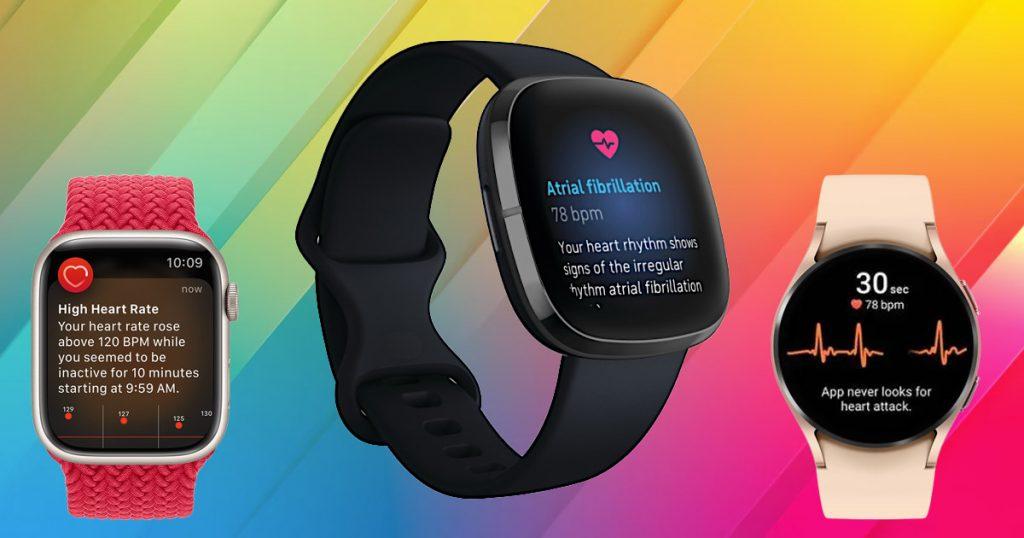Smartwatches and other wearable technologies are becoming increasingly popular in the health industry, offering potential benefits for individuals with heart conditions like atrial fibrillation. These devices enhance accessibility to health data, enable self-monitoring, and facilitate better communication with healthcare professionals. Various leading brands of wearable devices are available, frequently introducing new models with approved health monitoring applications. If you’re interested in self-monitoring your AFib, there are excellently approved smart watches that detect AFib, which we’ll delve into further after discussing some key facts about AFib and the role of ECGs.
What is Atrial Fibrillation?
Atrial fibrillation, often called AFib or AF, is a frequent heart problem where the heart beats in a weird, irregular way. When someone has AFib, their heartbeat can be fast, slow, or just not steady. It’s a condition that sticks around for a long time, even though strange heartbeats might happen now and then. So, even though the episodes of AFib can come and go, AFib itself is a long-term issue.
Why are ECGs important in the detection and management of AFib?
An ECG, short for electrocardiogram, is a vital tool for diagnosing and monitoring heart conditions like AFib. It’s a painless test that records the heart’s electrical activity, helping doctors diagnose various heart issues. During a traditional ECG, 12 small stickers called electrodes are placed on the skin to measure heart activity from different angles.
The resulting recording shows a series of waves representing heart rhythm, which cardiologists interpret to understand the heart’s health. This 12-lead ECG is highly reliable and commonly used in clinics and hospitals. Cardiologists and specialized Electrophysiologists analyze the shape and timing of the waves to diagnose heart problems accurately and determine their location within the heart.
Are there smartwatches that detect AFib?
New wearable technology now allows users to take an ECG directly from their smartwatch, making it easy to check their heart’s electrical activity in real time. These smart devices can also detect certain irregular heart rhythms, like AFib, using advanced algorithms. Some watches can even alert wearers if they show signs of AFib, becoming the first to notify them of potential heart issues.
What are the limitations of a smartwatch that detects AFib?
Wearable ECGs have some drawbacks compared to a 12-lead ECG. These include:
- Less info: Wearables give less data on the heart’s activity than a 12-Lead ECG, so they might miss certain conditions.
- Less accurate: Wearables may not measure as precisely due to using fewer sensors.
- Can miss conditions: They might not catch certain heart issues like bundle branch blocks.
- Signal issues: Single-lead ECGs can pick up interference, affecting the accuracy of the reading.
- Need proper placement: For accurate results, wearables must be positioned correctly.
- Not for diagnosis: They’re not meant to diagnose or replace medical advice or traditional ECGs.
Top Smartwatch Brands that Monitor and Detect AFib
Apple Watch
Apple introduced the ECG feature in its Watch Series 4, letting users take an ECG from their wrist, making it the first direct-to-consumer product of its kind. This feature, along with the irregular rhythm notification, got approval as a Class IIa medical device. The irregular rhythm notification checks heart rhythms and alerts users if it detects irregularities, like AFib.
Apple validated the accuracy of the ECG app and the irregular rhythm notification feature through clinical trials involving around 600 participants and the Apple Heart Study, which involved over 400,000 participants, making it one of the largest cardiovascular trials ever conducted.
Samsung Galaxy
In August 2021, Samsung Electronics shared that their Health Monitor app was coming to the newest Galaxy Watch series, letting you track blood pressure and use TGA-approved ECG monitoring.
The Samsung Galaxy Watch 5 has a special sensor that does three things:
- BIA: Keeps tabs on body fat percentage and skeletal muscle weight.
- ECG: This android ECG watch keeps an eye on your heart rate and rhythm for any oddities in real time.
- Optical Heart Rate Sensor: The heart monitor watch for AFib can also track your heart rate and keep an eye out for any unusual readings, including blood pressure.
Fitbit Sense & Fitbit Charge 5
The Fitbit ECG app includes two parts: the one on your Fitbit device and the Heart Rhythm Assessment in the Fitbit phone or tablet app.
You use the Fitbit ECG app to make and save an ECG. After that, it checks the recording and shows you the results on your phone or tablet.
AliveCor KardiaMobile
The KardiaMobile is a small device that connects to your smartphone and records an ECG, even though it’s not a watch. There are two versions: KardiaMobile and KardiaMobile Card, which record a single-lead ECG, and the newer KardiaMobile 6L, which is the only FDA-cleared, 6-lead personal ECG. AliveCor, the company behind it, says having six leads gives you and your doctor a super detailed look at your heart, almost like being in a hospital.
You can only get the KardiaMobile 6L with a KardiaCare membership, unlocking exclusive features in the Kardia app. It works differently from smartwatches because it uses special technology to change signals from your fingertips into ultrasound signals that go to your phone’s mic. To use the six-lead version, you put it on your fingers and rest it on your knee to record the ECG.
Try Smart Watches to Detect Your AFib and Ensure Your Overall Well-Being
Interested in monitoring your heart health? Learn how smartwatches and wearable devices offer accessible ways to track AFib and other irregular heart rhythms. Understand the importance of ECGs in detecting and managing AFib, and explore the limitations of wearable ECGs compared to traditional methods. Discover top brands offering AFib detection features in their devices, providing convenience and peace of mind. Take charge of your heart health today with the latest in wearable technology.
